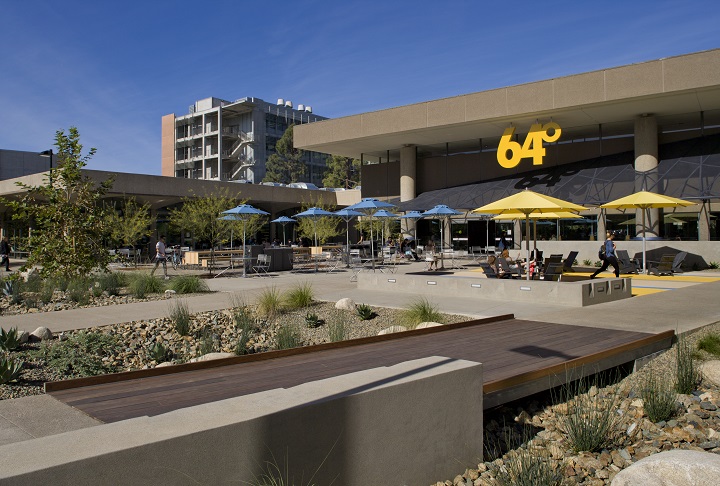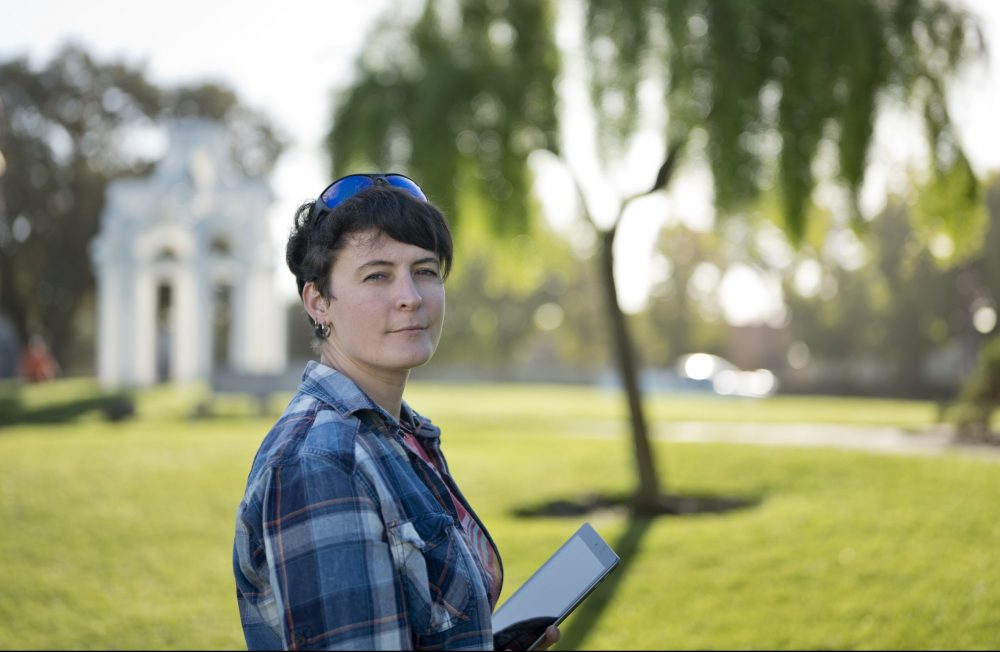Daily Business Report-Jan. 9, 2015
Revelle College’s new 64 Degrees residential dining facility.
UC San Diego’s Revelle College Shows Off
Its Newest Concept in Residential Dining
64 Degrees (64°), the newest concept in residential dining at the UC San Diego campus, draws on the long history of the Revelle College and its namesake Roger Revelle.
The dining facility, which recently held its grand opening, was constructed at a cost of $12.1 million. It is a complete renovation of the 1966 Revelle Dining Commons, the original dining destination on campus.
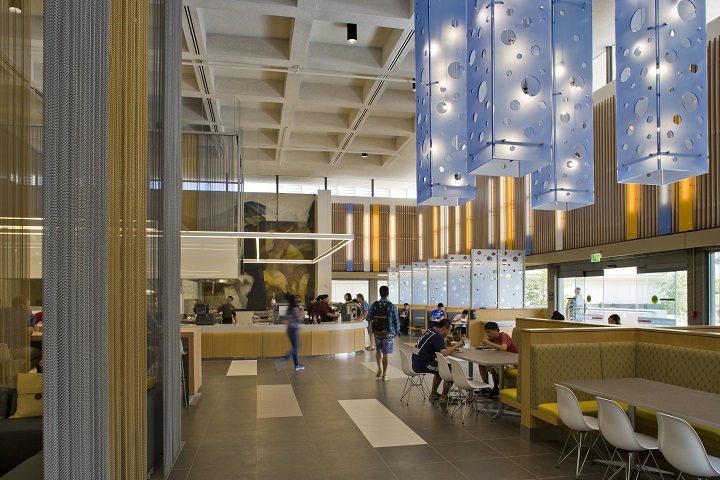
The restaurant, designed by Studio E Architects, was named 64 Degrees in reference to the average temperature in La Jolla, the founding year of Revelle College (1964) and the height of Roger Revelle (6-foot-4).
The UC San Diego’s department of Housing Dining Hospitality, as the client for the project, had goals to provide a dining experience that was interactive and put the act of cooking and the natural beauty of food on display.
“The architecture team took an extremely dated “cafeteria”-style facility and transformed it into a vibrant place like no other on this campus or any other,”
said Maxine Ward of Studio E Architects. “In collaboration with Webb Food Service Design, the design team focused on the client’s desire for an innovative food concept destination and the creation of a place that the Revelle College community would embrace as a hub for congregating and socializing.”
Besides the dining area, the program also included a cafe/market within the building and the renovation of two adjacent exterior courtyards to the north and south of the building. The new design creates a seamless transition between the exterior and interior spaces.
The facility seats 288 in the main dining area and 35 in the cafe/market. The exterior spaces were designed to accommodate seating of 190, with concrete seat walls providing additional seating. A variety of seating options are mixed among the food platforms, ranging from large six-person booths to counter seating at windows overlooking the courtyard to counter height community tables to soft seating around the fireplaces.
Swinerton Builders was the general contractor.
San Diego May Receive State
Funding for Construction Projects
The state Department of Industrial Relations Thursday included San Diego on a list of municipalities eligible for state financial assistance on major construction projects, despite voter passage of an intitiative that prevents the city from requiring Project Labor Agreements.
City officials had worried that San Diego would lose state funding after voters overwhelmingly passed the anti-PLA initiative in 2012.
PLAs are seen by opponents as favoring organized labor, thereby raising project costs. Union supporters in Sacramento responded by passing legislation barring state financial help in cities that ban the agreements.
However, San Diego’s intitiative carried an exception that allows for PLAs when required by state law.
City Attorney Jan Goldsmith said the city’s legal argument was novel but convincing to state lawyers.
“The only threat was on the political side,” Goldsmith said. “Speaker Toni Atkins was able to keep Sacramento politics from being an obstacle.”
Atkins is a San Diego Democrat who leads the Assembly and is a former City Council member.
“This allowed our office and the state’s lawyers to resolve this on legal — not political — grounds,” Goldsmith said. “Having served in the Sacramento Legislature, I know the value of what Toni Atkins did for San Diego.”
According to the City Attorney’s Office, inclusion on the list means San Diego can benefit from state programs and bond measures, including the Water Quality, Supply and Infrastructure Improvement Act of 2014, which voters approved last November. The measure provides $7.5 billion in funding for water projects that are part of a statewide, comprehensive water plan.
San Diego’s presence on the state eligibility list was in doubt as recently as last fall.
To be eligible for state funding, the cities also had to comply with the state’s prevailing wage and apprenticeship requirements on all public works projects.
— City News Service
Faulconer Not Interested in Barbara Boxer Senate Seat
Scratch San Diego Mayor Kevin Faulconer from the list of possible successors to Sen. Barbara Boxer (D-Calif.), who announced Thursday that she will not seek re-election next year.
Faulconer caught the attention of state and national GOP leaders when he was elected mayor, and his name was the first on a list of potential GOP candidates published by the Sacramento Bee — and compiled by a former U-T San Diego political reporter.
Faulconer, however, said he wasn’t interested.
“My focus is on leading San Diego and continuing to write our city’s comeback story,” he said.
Faulconer, 47, served two terms on the City Council before winning a special election in February to replace disgraced former Mayor Bob Filner.
Though often successful in San Diego area elections, Republicans have come up short in runs for statewide office over the past dozen or so years, winning only in exceptional cases, such as when ex-Gov. Gray Davis was recalled.
Boxer, a 74-year-old who first came to prominence in Marin County and now lives in the desert city of Rancho Mirage, said in an online video that she plans to focus on her PAC for Change to help make sure the Senate remains progressive. She wants to see a Democratic president elected in 2016 too.
Other potential GOP candidates on the SacBee list include former gubernatorial candidate Neel Kashkari, onetime Senate candidate Carly Fiorina and ex-Secretary of State Condoleezza Rice.
Among the Democrats being talked about are Lt. Gov. Gavin Newsom, Attorney General Kamala Harris and former Los Angeles Mayor Antonio Villaraigosa
— City News Service
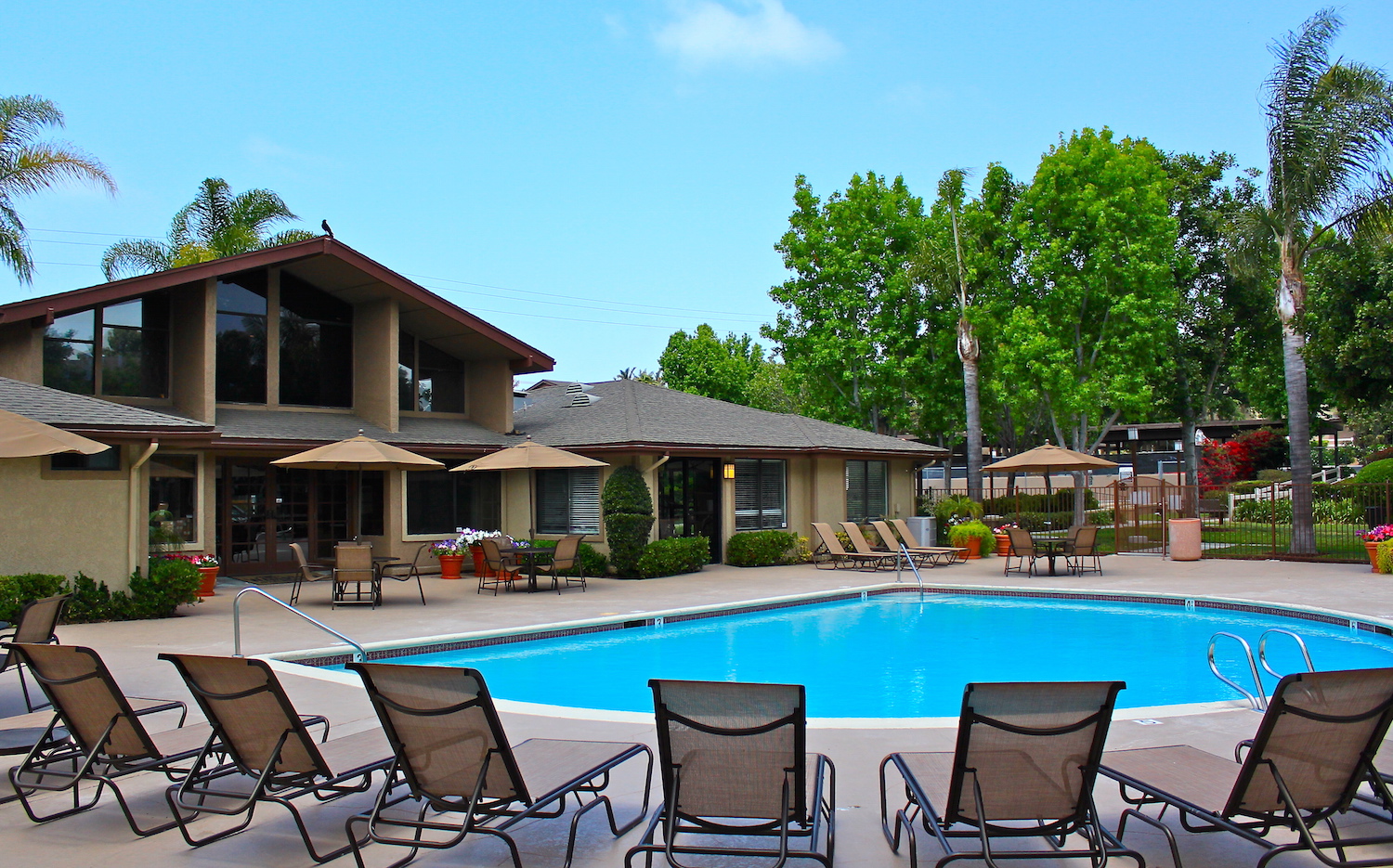
Vista’s Waterleaf Apartments Sell for $86.2 Million
VISTA — The 456-unit Waterleaf Apartments in Vista has been sold for $86.2 million to Los Angeles-based TruAmerica Multifamily and joint venture partner Investcorp. The sellers: RedHill Realty Investors and AEW Capital Management.
Built in 1984 on a 20-acre site in northwest Vista, Waterleaf is a mix of one- and two-bedroom apartments ranging in size from 740 to 940 square feet, each with its own washer and dryer. The apartment community features a clubhouse, two pools/spas, fitness center, tennis and basketball courts, playground and pet park. The property was 97 percent leased at closing.
TruAmerica said it will undertake a multi-million dollar capital improvement program that will include common area upgrades and the completion of unit interior renovations that were started by the previous owner. Improvements will include faux-wood flooring, upgraded cabinets and countertops, and new appliance packages.
With the acquisition of Waterleaf, TruAmerica has been involved in two of the largest multifamily transactions recorded in San Diego County in the past 18 months. TruAmerica also advised on the $81 million October 2013 acquisition of Plaza D’Oro, a 221-unit Class A apartment community in Oceanside.
Cushman & Wakefield represented both parties in the Waterleaf Apartments sale.
Home Sales Prices in San Diego County
Increased by 9 Percent in 2014
Prices of previously owned homes sold in San Diego County rose by 9 percent during 2014, according to new housing statistics from the Greater San Diego Association of Realtors.
While not as dramatic as the 20-percent rise in prices the previous year, the increase is a healthy sign for the local housing market. The 2014 median price of single-family homes increased to $495,000, while the price of condos and townhomes reached $325,000.
Sales increased in December compared to November. Single-family home sales jumped 11 percent, and condos/townhome sales were up 5 percent. For the year, however, total sales were 12 percent lower than 2013.
Active listings on the Multiple Listing Service (MLS) in San Diego County have been on the decline, and are now less than 6,000, about the same as one year ago, representing about 2.5 months of housing stock. (Five to six months is considered a healthy inventory level.) On average in 2014, homes were selling within 45 days of their list date.
“I think you will see more homes on the market this year and I think San Diegans can expect to see home values rise at a healthy level,” said SDAR’s 2015 board President Chris Anderson. “Interest rates are expected to increase slightly this year. That should boost inventory levels and drive sales.”
In December, the ZIP codes in San Diego County with the most single-family sales were:
• 92157 (Oceanside) with 49
• 92114 (Encanto) with 43
• 92127 (Rancho Bernardo) with 42
• 92028 (Fallbrook) with 42
• 92009 (Carlsbad) with 40
The most expensive listing sold in the county last month was a three-bedroom, three-bath, 2,500-square-foot beach home in Solana Beach that sold for $8.75 million.
Confidence among CEOs of Small,
Mid-Sized Businesses Hits 10-Year High
Optimism among small and mid-sized business has reached levels last seen during the pre-recession years of the early 2000s, according to the Vistage CEO Confidence Index, the largest survey of chief executives from small- and medium-sized businesses in the United States. This 10-year optimism high among business leaders indicates that the majority believe the economy has made substantial progress and will continue to grow in 2015.
“In addition to the gain in confidence among CEOs in the closing quarter of 2014, indicators including the likelihood of increased interest rates around mid-2015, a tightening labor market and significant upward pressure on wages reflect the growing strength of the current U.S. economy,” said Richard Curtin, a research professor in economics and the director of consumer surveys at the University of Michigan who analyzes all Vistage survey results.
Vistage is headquartered in San Diego.

Carlsbad Dedicates and Lights Archway Sign
CARLSBAD— A once forgotten landmark is making a comeback in Carlsbad — an archway sign spanning Carlsbad Boulevard, near Carlsbad Village Drive. The sign was dedicated and lighted Thursday night.
The illuminated marker will commemorate the important role that business has played in the success of the city over the decades and also pay tribute to Carlsbad Boulevard’s role as part of the Historic U.S. Route 101, the Pacific Coast Highway.
The entire sign stretches nearly 82 feet across the street. Located in the middle of a truss system, the sign portion is nearly 31 feet long and 5-feet-5 inches tall. Support beams raise the sign more than 29 feet from the ground.
The design of the marker is modeled after a sign that was built near the site in the 1930s. It features the city’s name on both sides in bold, white letters on a blue background with thin beige and black border accents.
“This sign, which will be enjoyed by current and future generations of Carlsbad residents and those who visit our city, adds a distinctive touch to the Village area,” said Ted Owen, president and CEO of the Carlsbad Chamber of Commerce. “It’s a testament of the positive impact that businesses and the Carlsbad Chamber of Commerce have had in forging the future of the City of Carlsbad over the years.”
The sign was spearheaded by Carlton Lund, the immediate past chairman of the chamber’s board of directors. It was made possible by a contribution from the TaylorMade Golf Co.
The Carlsbad City Council approved the sign in June.
Customer Demand Exhausts Funds
For Turf Replacement Program
After a successful run of more than two years, the San Diego County Water Authority’s turf replacement incentive program has stopped accepting applications because grant funds for the initiative will be exhausted by pending rebate requests. Launched in December 2012, the WaterSmart Turf Replacement Program will directly account for the replacement of more than 1 million square feet of water-intensive turf grass with low-water-use landscapes across the region.
Approximately 1,000 turf replacement projects will be funded through the program when all the money is spent, and Water Authority staff estimates these projects will save 1,350 acre-feet of water over the next 10 years — an important component of larger efforts to conserve water supplies by reducing landscape irrigation. Residents and businesses in San Diego County still can apply for turf removal rebates of $2 per square foot from the Metropolitan Water District of Southern California at www.SoCalWaterSmart.com. These rebates are partly funded by the Water Authority through water rates paid to MWD.
At its regular meeting on Jan. 22, the Water Authority’s board will receive an update on the turf replacement program along with other conservation programs and efforts to develop a pilot public-private partnership designed to reduce the cost of installing artificial turf in the region.
Lawyers Club of San Diego Awards $37,500
In Grants to Support At-Risk Women and Youth
Lawyers Club of San Diego presented grants totaling $25,000 to 10 local nonprofit organizations at its annual holiday luncheon. This amount is in addition to $12,500 granted earlier this year, totaling $37,500 in grants made by Lawyers Club, through its Fund for Justice, in 2014.
The Lawyers Club Fund for Justice awarded grants including $7,000 to the San Diego Volunteer Lawyer Program Domestic Violence Prevention Project; $4,000 to SDVLP for the annual Women’s Resource Fair, co-sponsored by Lawyers Club; $2,500 to Big Brothers Big Sisters of San Diego; $2,500 to the Juvenile Court Book Club; $2,500 to New Entra Casa; $1,500 to Center for Community Solutions; $1,500 to the Family Justice Center Foundation; $1,500 to Reading Legacies; $1,000 to Casa Cornelia Law Center; and $1,000 to Women’s Empowerment International.
In its spring grant cycle, the Fund for Justice made grants totaling $12,500 to seven additional organizations: $2,500 each to Hannah’s House, Kids’ Turn, and Musicians for Education — Street of Dreams; $1,500 each to Generate Hope and Palomar Health — Forensic Health Services; and $1,000 each to Break the Silence and Dress for Success-San Diego.
Changes Proposed in Minimum
Wage Referendum Process
Councilman Todd Gloria, whose proposal to raise the minimum wage in the city was stalled by a petition drive, proposed a series of changes Thursday in the referendum process.
In a memo to his replacement as council president, Sherri Lightner, Gloria asked for his ideas to be aired before the new Charter Review Committee sometime early this year. His proposed changes would, if approved, change local regulations and state law.
In San Diego, Gloria wants more timely disclosure of the financial backers of referendum efforts, and to allow representatives of proponents and opponents to view the signature verification and counting process at the county Registrar of Voters. He’s also asking for a review of applicable city charter and municipal code sections to make sure they’re clear and consistent.
His statewide proposals involve regulating how information is presented on petitions, ensuring the accuracy of statements made by signature gatherers, disclosing and limiting the financing of paid signature gatherers, and raising the percentage of voter signatures required to qualify for a ballot.
Last year, the City Council approved an incremental increase in the minimum wage in San Diego to $11.50 an hour, but business interests collected enough signatures to force a public vote on the issue, probably in June 2016.
— City News Service
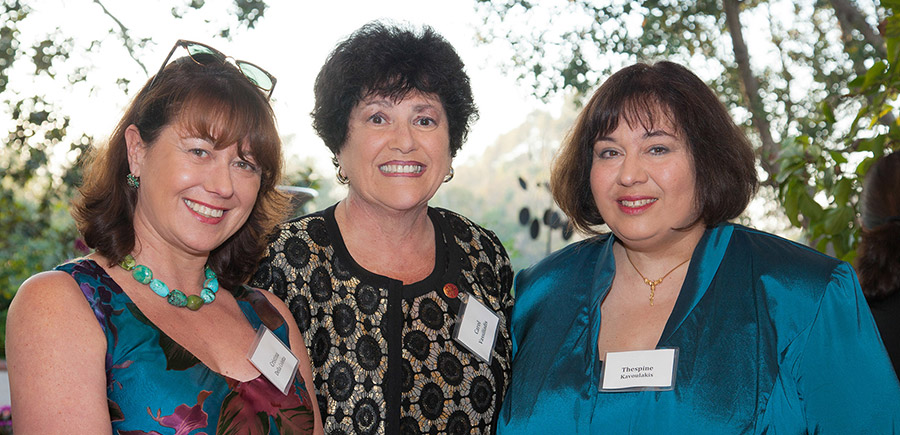
UC San Diego Launches
Center for Hellenic Studies
To deepen understanding and advance scholarship on Greek history, literature, archaeology and culture, UC San Diego’s Division of Arts and Humanities has launched an academic Center for Hellenic Studies — a modern forum where local and international faculty, researchers and students can collaborate and study the Hellenic world. The Hellenic Cultural Society and its members have contributed to the center, including $25,000 from the organization and a $1 million gift from an anonymous donor to encourage and inspire additional support.
The new program is anchored by endowed faculty chairs in Ancient, Byzantine and Modern Greek history. UC San Diego is one of the first campuses in the nation to possess teaching and research positions for distinguished scholars in all three major Greek eras. The local Greek community was an instrumental force in garnering support — totaling $1.5 million — to establish the Gerry and Jeannie Ranglas Chair in Ancient Greek History (2005); Alkiviadis Vassiliadis Chair in Byzantine Greek History (2005); and the Nicholas Family Endowed Chair in Modern Greek History (2008). In addition, the Hellenic Cultural Society donated more than 2,000 volumes of historical documents to the UC San Diego Library.
Personnel Moves
Jassim & Associates Adds Paralegal Mio Y. Casper
San Diego law firm Jassinm & Associates has hired paralegal Mio Y. Casper. Before joining the firm, Casper worked for eight years as forensic engineer for the Law Offices of Michael E. Moore, and as an intern investigator for the San Diego County Public Defender’s Office.
Born in Japan, Casper grew up in Indonesia, and went to high school in Singapore. She earned a Master of Forensic Science degree from National University in San Diego, and a bachelor’s degree in psychology from San Diego State University.
The law firm was founded by Pajman Jassim.
Xavier Martinez Reappointed to State Board
Xavier Martinez, 69, of San Marcos, has been reappointed to the California Physician Assistant Board by Gov. Jerry Brown. He has served on the board since 2014. Martinez has been owner of Martinez and Associates Inc. since 1995. He was a temporary tax preparer at Jassoy Graff and Douglas from 1993 to 1994 and temporary staff member at Security Pacific Financial from 1992 to 1994. Martinez was tax manager at McDonnell Douglas Computer Systems from 1989 to 1991 and at USA Petroleum from 1987 to 1988. He was director of taxes at the Wickes Corp. from 1973 to 1987. Martinez earned a master’s degree in taxation from Golden Gate University. The position does not require Senate confirmation and the compensation is $100 per diem. Martinez is a Democrat.

